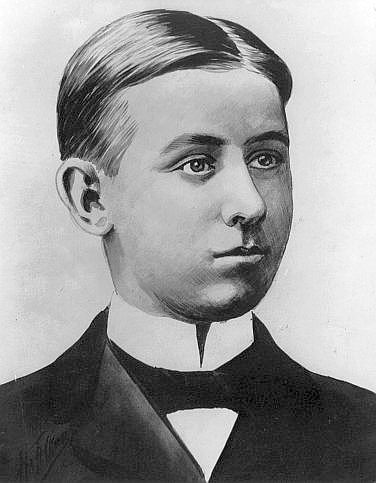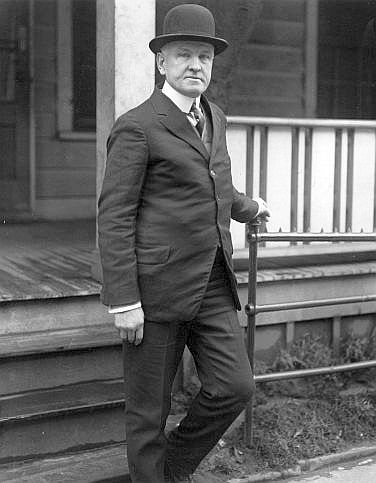|
View as a two-column galley proof
View as a feature
Patrick Crowe: The Friendly Kidnapper
by Jay Robert Nash
A disgruntled employee of the Cudahy Meatpacking Company of Omaha, Neb., Patrick Crowe decided to take revenge on his former employer by kidnapping 16-year-old Edward Cudahy, Jr. On the evening of December 18, 1900, Cudahy was returning from a doctor's office after having delivered second-hand magazines his father no longer wanted. Barring his path, wearing masks and wielding revolvers, were Crowe and accomplice James Callahan, also known as Pat Cavanaugh. "We're detectives," Crowe announced to the boy, "and you're a robber named McGee. We've been after you, McGee, and now we've got you. Come along with us."
Cudahy pushed away a revolver pointed at him and shouted: "You're crazy!" Ignoring the boy's protests, the kidnappers hustled him into a buggy, tied his arms and feet, and put a hood over his head. They then drove to an old abandoned house in the area and took Cudahy inside, handcuffing him to a chair and giving him a plate of food. Crowe and Callahan then celebrated their kidnapping feat by opening a bottle of liquor.
 |
 |
| Meatpacking heir, Edward Cudahy Jr., kidnapped in 1900 in Omaha, Nebraska; he was returned safely after a ransom of $25,000 in gold was paid. |
When the boy did not return home, Edward Cudahy, Sr. phoned the doctor who told him that Eddie had delivered the magazines several hours earlier and had left for home. Cudahy then called the police, and the entire force turned out to look for the missing youth. They were joined by hundreds of Cudahy's workers, who had been ordered to help search for the meatpacking heir.
By morning, when the boy did not return home, Cudahy realized that his son had been taken and he immediately offered a sizeable reward with no questions asked if his boy was returned to him. He also called agents in the Pinkerton Detective Agency, who began searching for Eddie. Most of the town of Omaha was mobilized for the search, more than 7,000 men and boys looking for the Cudahy heir, including 2,000 of Cudahy's workers.
That morning, Cudahy received a phone call telling him to search the front lawn of his mansion. His coachman found a ransom note that demanded $25,000 in gold. If the money was paid, the boy would be returned unharmed the note read, but if Cudahy refused to pay, the kidnappers vowed that they would blind the boy with acid. To instill fear within the Cudahy family, the kidnappers made mention of the fate that befell Charley Ross, a millionaire's son who had been kidnapped in 1874, and how the boy vanished forever when the ransom for him was not paid.
Cudahy put five sacks of gold coins amounting to $25,000 into a buggy that night and delivered this money to a remote spot on the outskirts of Omaha. His son was released unharmed some hours later. Cudahy, once his son was safely back home, offered a $25,000 reward for the capture of the kidnappers, but interest in apprehending these culprits was practically nonexistent as Cudahy was not a well-liked man. He paid his employees slave wages and was a severe taskmaster, who had smashed several campaigns to unionize the suffering meatpacker workers.
Police detectives studying the case and various descriptions given of the men seen with the Cudahy boy, concluded that the kidnapping had been masterminded by a colorful character named Pat Crowe, one-time Cudahy employee, who had turned to train robbery and other criminal pursuits.
 |
 |
| Patrick Crowe, the kidnapper of Edward Cudahy Jr., who made amends and capriciously sent his victim cards each year on the anniversary of the crime. |
Crowe, born on an Iowa farm in 1864, was one of eleven children. At age seventeen, when his mother died, Crowe moved to Omaha, operating a successful butcher shop with his partner Callahan. Through pressure, he lost the shop to the Cudahy operation, or so he later claimed, and went to work for Cudahy, who personally fired him after Crowe was accused of pilfering meats and money.
Under the alias of Frank Roberts, Crowe committed a robbery in Illinois and had been sent to Joliet State Prison to serve a seven-year sentence in 1897, but was released in 1900. He blamed all his woes on Cudahy, and, when he returned to Omaha in 1900, he vowed revenge by kidnapping the Cudahy boy.
Crowe, however, was nowhere to be found. He was reported to be in China or in the South Seas, off on some adventure. The kidnapper, in February 1901, then began sending a series of letters to Cudahy, first claiming he was innocent, then offering to return $20,000 of the $25,000 in ransom money.
Callahan was caught in 1901 and identified by Eddie Cudahy as one of the men who had kidnapped him. He was tried for the Cudahy kidnapping. Oddly, Nebraska had no fixed laws governing the crime and Callahan was acquitted. The search for Crowe went on.
After reportedly serving with the Boers in South Africa in their fight against the British, Crowe returned to the U.S. in 1906. He sent Cudahy's money back to him through an Omaha attorney, he claimed. Then he publicly declared that he, indeed, had kidnapped Eddie Cudahy, and submitted himself to trial.
Crowe had picked an opportune time to surrender. Feeling against the meatpacking trusts was high and Cudahy represented workers oppressed by unyielding owner class. Unions were organized, and the meatpacking czar was under siege to change his employment procedures. Crowe's trial took place at the height of this crisis, and he was, not surprisingly, acquitted as had been Callahan some five years earlier.
Crowe went on to become a popular lecturer, railing against the trusts. He authored two autobiographies and died in New York of heart failure in 1938. His kidnapping victim, Eddie Cudahy, Jr., headed his father's famous meatpacking firm throughout the first half of the 20th Century, retiring to Arizona, where he died in 1966.
Capriciously, Crowe, until his death in 1938, sent a postcard every year to Eddie Cudahy on the anniversary of the kidnapping and signed these missives, "from your old kidnapper." His victim kept those postcards as one would store fond keepsakes. Pat Crowe had been the first kidnapper to successfully collect a ransom in America.
View as a two-column galley proof
View as a feature
|